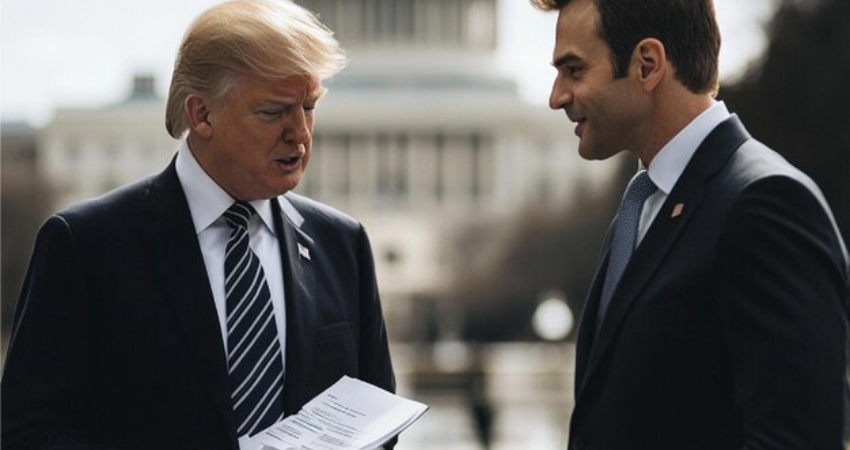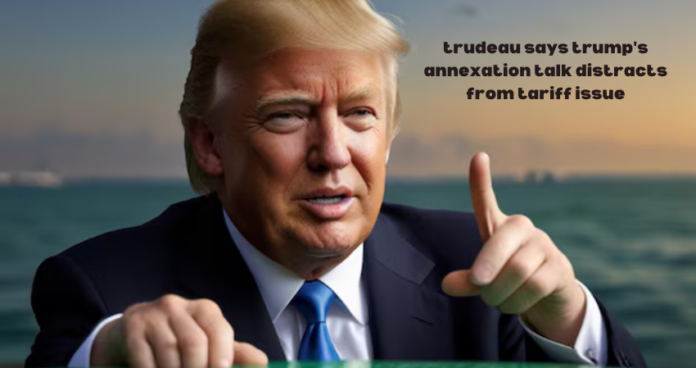In the complex world of international relations, political leaders often engage in strategic maneuvers to advance their national interests. Recently, a notable example has emerged involving Canadian Prime Minister Justin trudeau says trump’s annexation talk distracts from tariff issue. Trudeau has accused Trump of using annexation rhetoric as a distraction from pressing tariff issues between the two nations.
Introduction
In the realm of geopolitics, leaders frequently employ various tactics to shift public attention and negotiate favorable outcomes. A recent instance involves Canadian Prime Minister Justin Trudeau’s assertion that U.S. President Donald Trump’s talk of annexing Canada serves as a distraction from the more pressing issue of tariffs. This article delves into the intricacies of this political maneuvering, examining the context, implications, and reactions surrounding these developments.
The Emergence of Annexation Rhetoric
Trump’s Annexation Remarks
In a surprising turn of events, President Trump suggested the possibility of annexing Canada, proposing that it could become the 51st state of the United States. This bold statement raised eyebrows on both sides of the border, prompting discussions about the seriousness and implications of such a proposal.
Trudeau’s Response
Prime Minister Trudeau swiftly dismissed the annexation talk, emphasizing Canada’s sovereignty and national pride. He characterized Trump’s remarks as a diversionary tactic aimed at shifting focus away from the impending tariff dispute. Trudeau stated, “Canadians are incredibly proud of being Canadian. One of the ways we define ourselves most easily is, well, we’re not American.”

The Underlying Tariff Dispute
Trump’s Proposed Tariffs
The backdrop to this political theater is President Trump’s announcement of a 25% tariff on all Canadian imports unless Canada strengthens its border security. The proposed tariffs target key Canadian exports, including oil, gas, steel, and aluminum, which could have significant economic repercussions for both nations.
Canada’s Economic Concerns
Canada relies heavily on trade with the United States, making the proposed tariffs a substantial threat to its economy. The tariffs could lead to increased prices for Canadian goods in the U.S. market, reducing competitiveness and potentially resulting in job losses within Canada’s export sectors.
Analyzing the Distraction Strategy
The Art of Diversion in Politics
Diversion tactics are a common strategy in politics, used to shift public attention from unfavorable issues to more sensational topics. By introducing the idea of annexation, Trump may be attempting to divert media coverage and public discourse away from the contentious tariff debate.
Potential Benefits for the U.S. Administration
For the U.S. administration, the annexation talk serves multiple purposes. It stirs nationalistic sentiments, rallies political support, and places Canada on the defensive. This strategy could potentially weaken Canada’s negotiating position on trade matters.
Implications for U.S.-Canada Relations
Strained Diplomatic Ties
The annexation rhetoric and looming tariffs have strained the historically strong diplomatic relations between the U.S. and Canada. Such tensions could hinder collaboration on various fronts, including security, environmental policies, and international trade agreements.
Economic Ramifications
The economic interdependence between the two nations means that tariffs could have a boomerang effect, harming industries and consumers on both sides of the border. Disruptions in supply chains and increased costs of goods are potential outcomes of escalating trade tensions.
Domestic Reactions in Canada
Public Sentiment
The Canadian public has largely rallied behind Trudeau’s stance, viewing the annexation talk as an affront to national sovereignty. This surge in patriotism has bolstered support for the Prime Minister during a politically sensitive period.
Political Landscape
Domestically, Trudeau’s handling of the situation has implications for his political legacy. His firm response to Trump’s remarks may strengthen his position among constituents who value strong leadership in defending national interests.
International Perspectives
Global Reactions
The international community has watched these developments with interest and concern. Allies and trade partners are wary of the potential ripple effects on global markets and the precedent such annexation discussions could set.
Impact on Trade Agreements
Ongoing trade negotiations, such as those involving the United States-Mexico-Canada Agreement (USMCA), could be jeopardized by escalating tensions. Trust and cooperation are essential components of successful trade agreements, and current disputes may undermine these foundations.
Historical Context of U.S.-Canada Relations
A History of Cooperation
Historically, the United States and Canada have enjoyed a robust partnership, characterized by shared values, extensive trade, and mutual defense agreements. This foundation makes the current discord particularly noteworthy and concerning.
Previous Trade Disputes
While trade disputes between the two nations are not unprecedented, the intensity and public nature of the current situation are unusual. Past disagreements have typically been resolved through diplomatic channels without resorting to provocative rhetoric.
The Role of Media in Shaping Perceptions
Media Coverage of Annexation Talk
Media outlets have extensively covered Trump’s annexation remarks, amplifying the discourse and influencing public perception. The sensational nature of the topic has garnered significant attention, potentially overshadowing the substantive tariff issues at hand.
Influence on Public Opinion
The media’s portrayal of events plays a crucial role in shaping public opinion. Depending on the narrative presented, media coverage can either escalate tensions or promote understanding and resolution.

Potential Outcomes and Resolutions
Negotiation Scenarios
Diplomatic negotiations remain the most viable path to resolving the tariff dispute. Both nations have vested interests in maintaining a strong economic partnership, suggesting that compromise is achievable.
Long-Term Impacts on Bilateral Relations
The long-term impact of this episode will depend on the actions taken by both leaders in the coming months. Constructive dialogue and mutual concessions could restore and even strengthen bilateral relations, while continued antagonism may lead to a protracted rift.
Conclusion
The interplay between trudeau says trump’s annexation talk distracts from tariff issue focus on tariff issues highlights the complexities of international diplomacy. While diversion tactics are not uncommon in politics, the real-world implications of such strategies necessitate careful consideration and measured responses. The future of U.S.-Canada relations hinges on the ability of both nations to navigate these challenges with prudence and a commitment to mutual prosperity.
FAQs
1. What prompted President Trump’s annexation remarks?
President Trump’s annexation remarks appear to be a strategic move to divert attention from the proposed 25% tariffs on Canadian imports, shifting public discourse to a more sensational topic.
2. How has Canada responded to the proposed U.S. tariffs?
Canada has expressed strong opposition to the proposed tariffs, emphasizing the potential harm to both economies and signaling readiness to implement countermeasures if necessary.
3. Could the annexation talk impact ongoing trade agreements?
Yes, the annexation rhetoric could strain negotiations and implementation of trade agreements like the US


